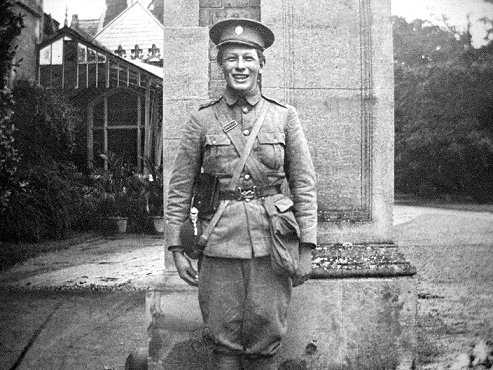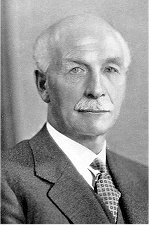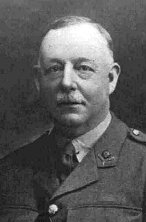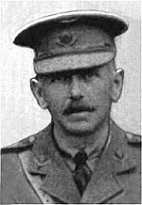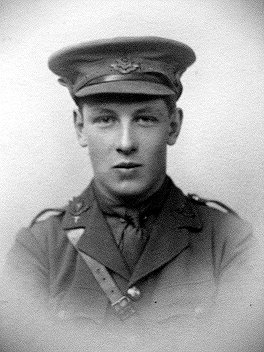Sir William Hugh Stobart Chance, C.B.E.
Part 1 - Eton College O.T.C. (1914) and joining the Worcestershire Regiment (1915)
There are not many of us left who can wear the sky-blue tie of the Royal Flying Corps with its dark blue and red diagonal stripes, and even if in some dark cupboard there still hangs a "maternity jacket" - the R.F.C. double breasted and high collared uniform of which we were so proud - increasing girth no longer makes it possible to gird our loins. How glad we were to sport our "Wings" and to throw away puttees for the light coloured breeches and field boots which indicated to the world that we had become pilots. When war broke out in August 1914 I was in camp with the Eton College O.T.C. near Aldershot. War was something we had never imagined would engulf us - Uncle George returning from the South African Campaign, and newsboys crying "Paiper, paiper, all the latest war news" when as children we were recuperating at a seaside resort at the time of the Russo-Japanese War, were just bits of news which in no way affected our calm Edwardian way of life. Camp broke up quickly and I came home to find my elder brother preparing to go overseas with his regiment, the 4th Dragoon Guards. In those far-off summer holidays I went to work in the laboratory and drawing office of Chance Brothers, the family glass and lighthouse manufacturing firm, until it was time to return to school for the Autumn "half". |
Sir Hugh as a member of the Eton College OTC |
In December most of my contemporaries were leaving early and I decided - without the enthusiasm some of them showed to get into the war before it finished - that I should leave too. Not being interested in horses, I decided that the County Yeomanry was not my line of country, so went with my brother - recently returned from France wounded and with an M.C. - to call upon the County Territorial H.Q. where we were seen by the County Secretary Major Reddie (later Sir John Reddie), and Colonel Mat Dixon - an old Volunteer officer who had returned to raise and command the second-line battalion of the 8th Worcesters. Although the battalion was nearly up to strength, there was still a vacancy for a subaltern; and after a short interview I was accepted and assigned to one of the eight companies parading on the small barrack square adjoining Territorial H.Q. in Silver Street, Worcester. We had no uniforms, few small-arms and very little equipment; but the battalion was as keen as mustard and had recruited a fine bunch of volunteers.
Before my commission came through, the battalion left for Northampton and with another newly-joined subaltern I was left behind to train a platoon of newly enlisted men. With the background of a "Certificate A", I managed to keep ahead with my "Infantry Training" and we daily marched down to the Pitchcroft to drill.
My parents went south to winter and I was left alone in our large country house - Blackmore Park, near Malvern. But I achieved one of my schoolboy dreams by acquiring a belt-driven two-stroke motor bike, on which I travelled daily to Worcester. It had no clutch or gears and to start it one pushed madly until the engine fired and one leaped onto the saddle.
In March 1915 my commission was gazetted and I joined the Battalion at Northampton, being posted to command a platoon in 'D' Coy. - the "Redditch" Company. The Battalion was billeted and there was no officers' mess. We met in the evening in one of the local pubs where the usual drink was a "sherry and bitters". The barriers imposed by the sheltered upper-class life which I had enjoyed began to be broken down - as far as I can remember I had never before consumed alcohol or seen the inside of a Private Bar.
Major John Reddie |
When our first-line division went overseas, the 61st Division moved to Essex to guard the coast against a possible German invasion and to dig trenches. After a short stay at Billericay we moved to Maldon, a small harbour on the river Blackwater. The 2/8th Battalion occupied the top half of the town and the 2/7th Battalion the lower part. One night when we were watching a film in the local cinema we heard a great roaring, and rushing out into the street we found a huge Zeppelin airship flying very low overhead. Some bombs and incendiaries were dropped round the ironworks near the harbour and a light left burning in Battalion H.Q. brought another shower which fortunately did no damage apart from destroying a wooden carpenter's shop and killing a blackbird. This was the first of a series of Zeppelin raids and our initial experience of enemy action. A few months later the Brigade was under canvas near Epping and one of the Gloucester battalions was having a guest night. Suddenly over the forest appeared a Zeppelin flying low, and the bomb-dropper must have been surprised to find himself over a large tented camp. Anyhow he forgot to remove the safety pins from the bombs which he let fly, and although several fell and buried themselves deeply in the ground, no one was hurt and the only casualty was the Gloucesters' mess tent which was set on fire by an incendiary. As we had only a few antique Lee-Metford rifles and no ammunition - the Gunners were equipped with Crimean muzzle-loading guns - there was no means of retaliation and the Zep flew off unharmed. At this period of the war the East Coast anti-aircraft defences consisted of two Rolls Royce cars each mounting a small pom-pom, and the Zeps which were brought down in flames were set on fire by early night-flying B.E.2c.s - Leefe-Robinson being awarded a V.C. as being the first man to cripple and destroy one of these huge but useless airships. Mersea Island lies at the mouth of the Blackwater and was reputed to be a place where German spies were landed from submarines: So a detachment of the 2/8th was sent to guard and patrol the coast. We had a long and very hot march to arrive at The Strood - a causeway - giving access to the island from the mainland. Pat Barrow - second in command of my Company - and I billeted the troops and decided to accept the offer of a local yachtsman to bed down in his hulk, a converted schooner. Mersea Island was the home of many of the professional crews who were recruited to man the big racing yachts of those days. After a heavy day I was too tired to get out of uniform, but Pat changed into "civies". We were peacefully relaxing when overhead on the deck we heard the stamping of field boots, and who should appear but our Divisional Commander the Marquess of Salisbury and some of his staff. Too terrified to speak I stood at attention, while Lord Salisbury ticked off Pat for being out of uniform, and next day he was returned to unit! We spent a pleasant month on Mersea - periodically going to the east end of the island to visit another detachment. Douglas Bomford, one its officers, was the proud owner of a Bradbury motor bike which one foggy evening deposited me into a ditch without damage to the bike or its rider. My own Douglas had been left behind at Maldon; it was a horizontally-opposed two cylinder model and a great improvement on its predecessor. |
Colonel Mat Dixon |
When we returned to Maldon, the Battalion was moved to Epping and later to Brentwood where Dick Stallard, Eric Mitchell and I found a very comfortable billet. Before we left Maldon the Division was reviewed by the Secretary of State for War, Lord Kitchener, paraded in a park near Chelmsford. After a long, hot, and tiring march, the Battalion sat on the grass to relax. Called to attention, we saw Lord Kitchener, mounted on a white horse, ride slowly down the lines while the battalions in turn presented arms. In front of us sat on their steeds our 6 ft. 8 in. Colonel Mat Dixon and Major Checketts, second in command, whose large bay horse had had more experience in the hunting field than on parade. After Christmas 1915 the Division was sent to Salisbury Plain, where we were in barracks at Tidworth and fired our musketry course on the nearby ranges. An epidemic of flu struck down many of us and I was carted off to hospital, to be cheered daily by the mournful sounds of a band detachment accompanying a firing party to the military cemetery. Infantry Training had its appropriate section on the honours to be accorded to the dead - "H'on the h'arrival at the Cemetery, Mortuary, or Dead-'Ouse, the troops will h'assume a dejected h'attitude" was the order read out by the Sergeant-Major in command. |
Major Francis Checketts |
While at Tidworth I was sent on a Stokes mortar course, having been to Bisley the previous summer to learn about machine guns. The Vickers and the lighter Lewis guns were only just being issued to the troops in France, so we spent our time on the old Maxim. The final stage of the course involved range practice - No. 1 picked up the gun, No. 2 the tripod, and No. 3 carried a box of ammunition. All the equipment was extremely heavy and we arrived panting after doubling several hundred yards from firing point to firing point.
The Stokes mortar was a primitive weapon consisting of a steel tube with base plate and two legs which could be adjusted to provide the requisite angle for range. The projectile was a steel cylinder at one end of which was inserted a 12 bore blank cartridge, while at the other end was a mechanism similar to that used on the Mills bomb. One cut a length of fuse to the appropriate length, fixed a detonator at one end and a .22 cartridge on the other, inserted the cartridge into the firing mechanism, which was then screwed down into the projectile. To fire the mortar the projectile was partially inserted into the muzzle, the safety pin pulled out, and sliding down the barrel the 12 bore cartridge was impaled upon a striker and "off she went". But things did not always work smoothly and on one occasion a ham-fisted operator pulled out the safety pin and let the firing lever loose before it had entered the barrel. The cartridge misfired and we leaped from the trench just before the mortar exploded.
2nd Lieut. William Hugh Stobart Chance |
By this time the Battalion was making good progress with its training and we had got over the loss of many of our best N.C.O.s and men who had been posted to the 1/8th Battalion to replace "Home Service only" volunteers. I had an excellent Platoon Sergeant, by name Tolley - soon to be promoted Company Sergeant Major - and an equally good Platoon Corporal. But the future of the Division was as yet undecided and it was rumoured that we were to be sent to India. The war in France had become static and seemed to have reached a stalemate, with both sides facing each other in line after line of trenches. In 'D' Company we were not too happy with our Company Commander, so when we heard that the Royal Flying Corps needed pilots Harold Pilkington, who had joined at the same time as me, decided we would apply to be seconded. After some hesitation on behalf of our C.O. and Captain Vigors the adjutant, our applications were forwarded and within a few weeks we were being interviewed at the Air Ministry by Captain Charteris, a charming ex-Regular Cavalry officer responsible for picking material thought suitable to be trained as pilots. I was asked about my weight and whether I had "a good pair of hands". As I was not a lightweight and hated horses, I came away rather despondent about my prospects. But all was well and in April 1916 I received orders to proceed to the preliminary training centre at Wantage Hall, a Hall of Residence of Reading University taken over by the R.F.C. I suppose there were about a hundred officers on the course; some had seen service overseas, some were newly commissioned into the Corps, and others seconded from their units at home. In some ways I was sorry to leave the Battalion; we had a very nice lot of officers and, if I had known it at the time, the 61st Division was to go to France before I had finished my training in the R.F.C. Curiously enough only one of the original 2/8th officers was killed in action - Lance Evers, who had won the M.C. and bar and who survived until just before the Armistice. The life of a subaltern in World War I was hazardous and many of my contemporaries at school, including my youngest brother - an Ensign in the Coldstream Guards - were to fall before the war ended. |

